Figure Ice Skating Ill Never Love This Way Again
I Hope to Never See a Figure Skating Event Like That Again
The beauty from some Olympic skaters was not worth seeing a child emotionally broken on live television.
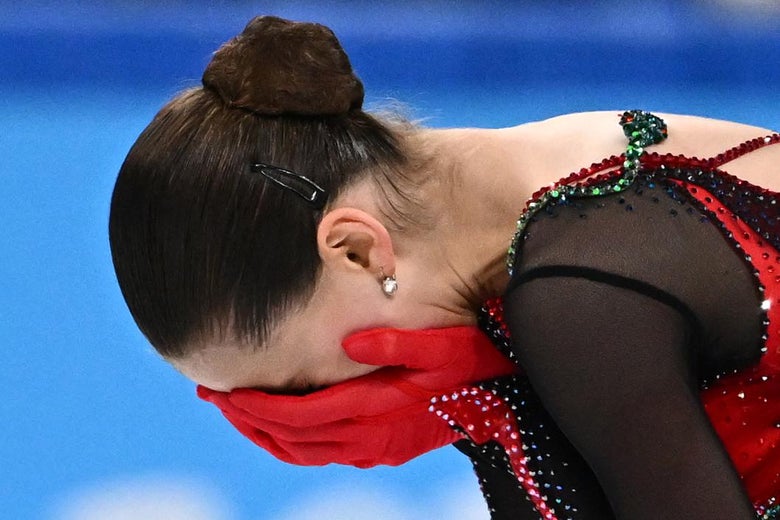
As a figure skater, you dream of what your Olympic moment will be like. The scores are read, your eyes go wide in disbelief, the announcer proclaims you're in first place. Can this be real? You hug your coach as the crowd goes wild. One of the joys of watching the Olympics is seeing moments like this, dreams realized. I have indelible memories of such celebrations. In 1998, Tara Lipinski leapt into the air and released a series of ear-splitting shrieks when she found out she won, embracing her coaches in pure joy. In 2002, Sarah Hughes fell to the ground in shock backstage, laughing and smiling in disbelief, her coach grabbing her face and exclaiming, "You won the gold medal at the Olympics!"
At the 2022 Beijing Olympics, there was no such moment of joy. The scene that I witnessed instead made me feel hollow and heartbroken, like I was somehow complicit in the mental anguish of these young women by even watching. When it was announced that 17-year-old Anna Shcherbakova was the gold medalist, the camera didn't even cut to her for several minutes. Instead, we watched 15-year-old Kamila Valieva, the girl at the center of the Olympic doping scandal, the skater seen as near certain to capture the gold medal, crumple into a ball of tears upon learning she had ended up in fourth place after a disastrous free skate. Valieva received only perfunctory support from her coach, Eteri Tutberidze, who had berated her as soon as she stepped off the ice: "Why did you let it go? Why did you stop fighting? Explain it to me, why? You let it go after that axel. Why?"
As Valieva exited the kiss and cry, she passed silver medalist Alexandra Trusova, also crying, throwing what can only be described as a temper tantrum. When someone offered Trusova an arm of support, she jumped away and shouted in Russian: "I can't see this! I won't see this!" One might have imagined these remarks were in sympathy for her training mate Valieva, but later comments made it clear it was bitterness over receiving silver. Trusova is quoted as exclaiming, "I hate it! … I don't want to do anything in figure skating ever in my life! … Everyone has a gold medal, and I don't!" One can forgive a teenage girl for having an emotional response to disappointment in a high-stakes situation, but Trusova's reaction was an ugly display of poor sportsmanship, happening mere feet from a devastated Valieva. Trusova would later have to be coaxed into even coming back onto the ice to accept her second place finish.
As Valieva retreated into the bowels of the stadium, the broadcast finally cut back to Shcherbakova, the Olympic gold medalist. She stood alone, joyless, clutching a teddy bear in silence. She shifted uneasily, eyes cast down to the floor, unsure where to look. She sat back down again on a couch, no one on her team anywhere in sight. It was perhaps the loneliest image I have ever seen at the Olympics.
Why was Shcherbakova all alone? For context, one must know that all three of these Russian teenagers are coached by Eteri Tutberidze. Ostensibly, the members of her team were off attending to the meltdowns of Valieva and Trusova. It called to mind the conclusion of the 2022 Olympics, in which Tutberidze's students Alina Zagitova and Evgenia Medvedeva finished first and second, respectively. That result was also seen as a big upset, as Medvedeva had been favored for gold. When the scores were announced, Medvedeva cried in disappointment as Zagitova sat backstage, nervously smiling through tears and staring down at a stuffed doll in her hands. Tutberidze has now left in her trail a plethora of teenagers who burned bright and then retired from the sport with injuries and eating disorders. Named the International Skating Union coach of the year 2020, Tutberidze is now at the center of a discussion about the treatment of minors in figure skating. Based on her treatment of her students in the past and her possible involvement in Valieva taking banned heart medication, I desperately hope Tutberidze is investigated and suspended from coaching. We cannot continue like this.
How did we get to this tragic triptych of Russians in distress? Let's break down what happened in the top performances of the night.
Wakaba Higuchi (Japan)
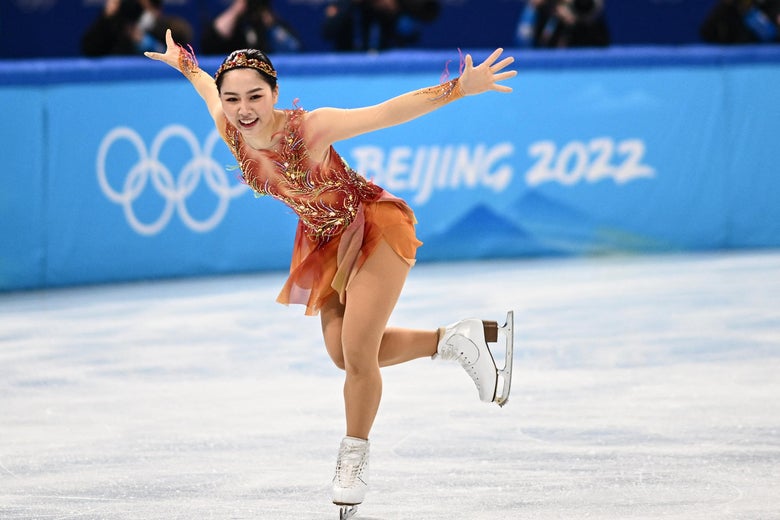
With a triple axel in her arsenal but no quad, Wakaba Higuchi had an outside shot at a medal if she skated cleanly and the skaters above her made errors. Higuchi skated to a Lion King medley, which might sound corny on paper, but was sincerely emotional and powerful in the arena. She nailed her opening element, the triple axel, with three and a half rotations so clearly executed it didn't even merit a review from the technical caller. Next, she attempted a triple lutz–triple toe combination, falling to the ice on the second jump. Not to be defeated, Higuchi rallied and hit her next five jumping passes cleanly. There's a star quality to Higuchi; you feel like you are watching both an athlete and an actress. As the program went on, rather than fade on tired legs, she seemed to grow in power. Her joyous step sequence stood out especially in this exhilarating performance. By the time "Circle of Life" blared through the arena, I was covered in goosebumps and tearing up, a little bit angry at myself for getting emotional to a Disney soundtrack. I wanted to stand by the edge of the ice with Higuchi and proclaim, "One day all this will be yours!" like Mufasa. She would finish fifth. I hope Higuchi sticks around for another Olympic cycle; the sport could use her performative luster in this dark moment.
Alexandra Trusova (ROC)
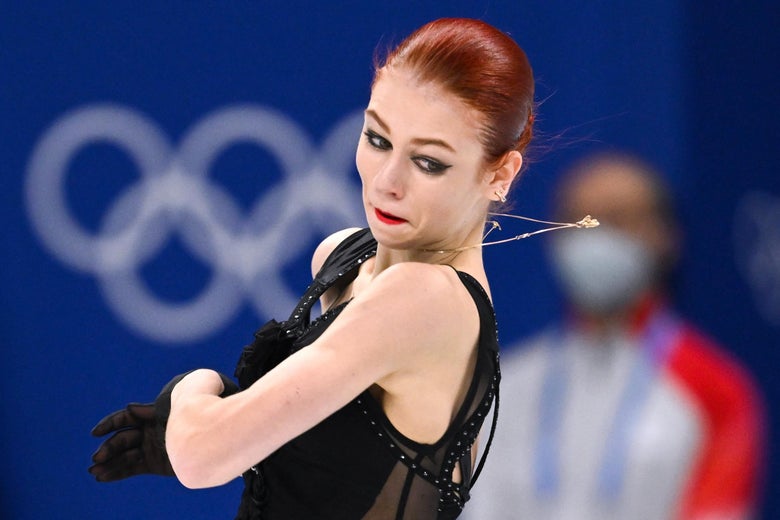
Alexandra Trusova skated the most difficult women's long program that has ever been performed at the Olympics. It was a feat of astonishing athleticism. And I hated watching it. I respected it, but I hated it. Skating to the rock 'n' roll Cruella soundtrack, this Disney moment did not work for me the way Higuchi's did. She opened with a clean quadruple flip and quadruple salchow, both performed with her arms over her head to gain extra points. She then stepped out of the landing on her next quadruple, a toe loop, and had a turnout on her next combination, a measly double axel–triple toe. Trusova then landed two quadruple lutzes back to back, one in combination. The technical difficulty was staggering; this program would be top tier in the men's event! Despite these jaw-dropping jumping passes, the artistic quality of the program was severely lacking. It felt dead-eyed, like watching a Terminator T-1000 skating, her choreography just a means to connect a series of jumping passes. Johnny Weir stated, "She really makes zero effort at the artistry." In my notes, I wrote down, "I feel nothing." Perhaps Trusova will grow into becoming a more expressive skater. Or maybe, like so many of Tutberidze's other pupils, she will retire soon, unable to bear the weight of such brutal training. Congratulations are owed to Trusova for doing things no other female skater has ever done before. But if that program was the future of women's figure skating, I want no part of it. Trusova went into first place after that program and would eventually end up with the silver medal. Her bitter outbursts afterward seemed to stem from disbelief: How could she pull off five quads and still lose? One has to wonder if a greater focus on her artistry could have earned Trusova the 4.22 points that separated her from the gold medal.
Kaori Sakamoto (Japan)
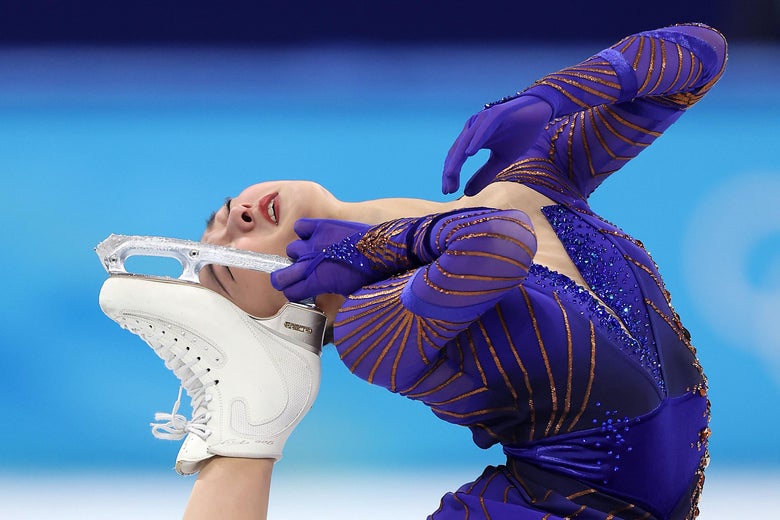
The contrast between Trusova and the next skater, 21-year-old Kaori Sakamoto, could not have been greater. Whereas Trusova attempted five quadruple jumps, Sakamoto attempted zero. She didn't even attempt a triple axel. And yet, in years to come, I will be rewatching Sakamoto's performance more than any other from this event. Skating to "No More Fight Left in Me" from the documentary Woman, she exuded feminine power and feminine tenderness simultaneously. It opens with spoken word, "I love being a woman. I love the tenderness, the sensitivity, the uniqueness." In the hands of a less confident skater, this could have come across as pretentious, camp even. But with Sakamoto in control, it connected straight to my heart. Although she did not attempt the very hardest jumps in the sport, Sakamoto completed her jumping passes cleanly and with impeccable technique and great speed, racking up points for high grade of execution. When she performed her step sequence, I felt like I was soaring along with her. It was a relief to see a woman skate in a field filled with children. When she hit her final pose, I couldn't help but applaud. This, I thought, is what the sport could be like if it were not obsessed with the acrobatics of teenagers. Sakamoto's skate was enough to earn her a well-deserved bronze medal. If the age minimum for the Olympics were raised to 18, as some have suggested is necessary, she would be the Olympic gold medalist.
Anna Shcherbakova (ROC)
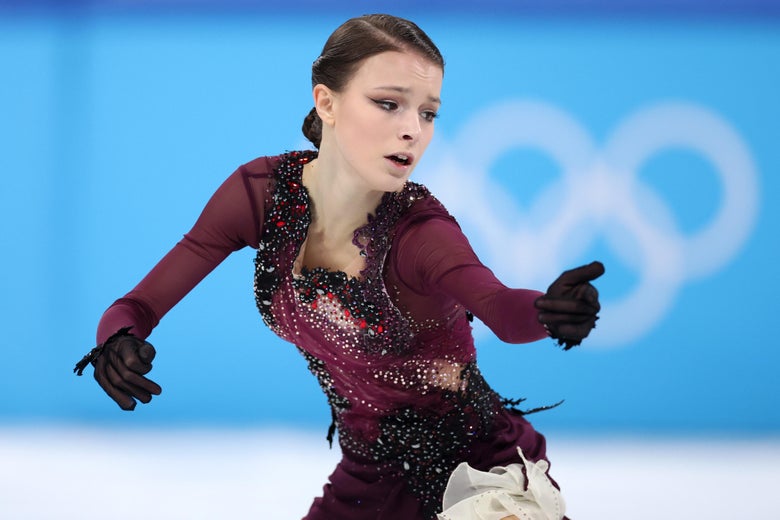
It is odd to feel sorry for someone who has just won the Olympic gold, and yet I feel sorry for Anna Shcherbakova. Her astonishing performance will forever be overshadowed by the doping scandal involving her coach and another Russian skater. Performing to the score from The Master and Margarita and Mozart's Requiem, Shcherbakova showed how quadruple jumps can be incorporated into women's skating without being a detriment to artistic expression. There was a shocking confidence from the 17-year-old. She opened with a quadruple flip–triple toe combination and then pulled off another quadruple flip afterward. From that moment on, I never felt worried she would miss an element. Shcherbakova went on to complete her next five jumping passes of double axels and triple jumps cleanly. I felt totally absorbed in her performance. She always seemed present; she made each moment seem urgent. Her free skate started out innocent and tender, then transitioned to cheeky and playful, and by the time Mozart's Lacrimosa was echoing through the stadium, she took on an energy I can only describe as "apocalyptic grace." It was a commanding gold medal performance, a virtuosic blend of physical strength and emotional vulnerability. I hope Shcherbakova is able to celebrate this win in the days to come. Sadly, on the night of, she appeared overwhelmed and lost amid the chaos surrounding her.
Kamila Valieva (ROC)
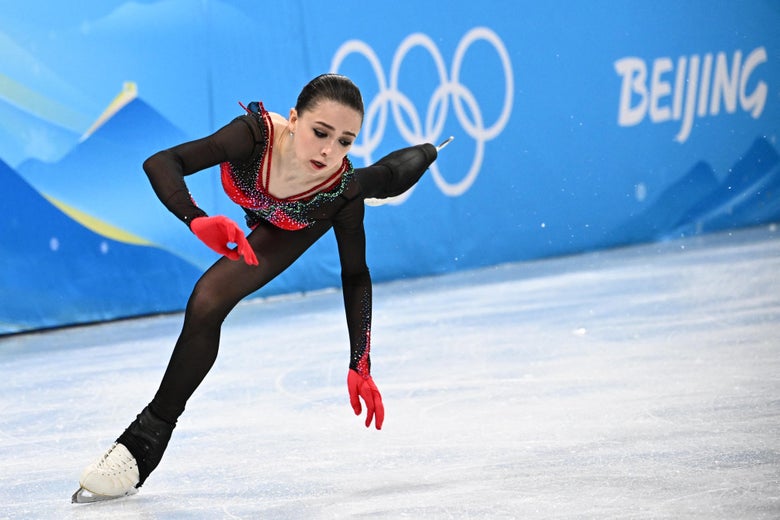
The final skater of the night was 15-year-old Kamila Valieva, the one who tested positive for a banned substance but whom the Court of Arbitration for Sport allowed to compete anyway. You don't want to watch this performance. It will only leave you feeling anger, pity, and distress. Valieva's program started off with a quadruple salchow. She landed the jump, but there was visible effort for her to barely hang on to that landing. Something seemed off. Next, Valieva went for a triple axel with her arms over her head. She stepped out of the landing and put a hand on the ice, a shocking error that elicited a gasp from the crowd. It was only downhill from there. She stepped out of her next quadruple toe loop and fell on a badly underrotated triple salchow immediately after. In the rest of her program, she managed to cleanly land two jumping passes, but fell again on a quadruple toe loop and had a two-foot landing on her final triple-triple combination. As for her artistry, she seemed frightened and lost on the ice. It appeared as if no one was home inside Valieva's head—like she was being piloted from afar with a remote control. As she plodded through a program set to the droning beat of Ravel's Bolero, I felt like I was watching a death march. I wanted them to cut the music and just let this poor girl off the ice, but one of the cruelest things about skating is that you must keep on skating no matter how many mistakes you make; the only way out is through the end of the program. After her music concluded, Valieva buried her head in her hands and cried. At the most important moment of her life, she skated the most error-filled program I've ever seen from her. Kamila Valieva, the heavy favorite for the gold medal in Beijing, would end up with no medal at all, landing in fourth place, 9 points behind Kaori Sakamoto.
If there is any silver lining in this event, it is that there will be a medal ceremony for the women's event after all. The International Olympic Committee had announced that there would be no medal ceremony if Valieva placed in the top three, so that the investigation into her doping could be completed. In allowing Valieva to compete in the event, the CAS cited the "irreparable harm" that would be done to this young skater by not allowing her to compete. What I witnessed in the women's free skate was not only irreparable harm to Valieva but also to the sport of figure skating.
Where do we go from here? How can our sport go on witnessing children be broken by a brutal coach who may even be encouraging them to take banned substances? While I am happy for Shcherbakova and Trusova achieving medal-winning performances, can I trust that they are entirely clean too? Since they have the same coaching team as Valieva, one must at least consider whether they have been pressured to dope as well.
I am scared that Valieva's fourth place finish will be an excuse for figure skating to brush this incident under the rug. Nothing to see here! The doper didn't even medal! But the skating community must demand investigation and consequences for what has happened. Figure skating has given me some of the most beautiful and ecstatic moments of my life. But at what cost? I am reminded of the Ursula K. Le Guin short story "The Ones Who Walk Away From Omelas." In the story, there is a utopian city of impossible perfection, but for that perfection to exist, one small child must be kept in darkness, squalor, and misery. When they reach a certain age, citizens of Omelas learn about the child. Most of them stay, deciding the greater happiness outweighs the pain of this child. Others walk away, alone, into an uncertain future. I hope I never see an event again like the one I witnessed Thursday. For me, the beauty on display from some skaters was not worth seeing a child emotionally broken on live television. If figure skating cannot find a way to protect the innocent youth in its ranks, I am prepared to walk away.
murphycomenclater.blogspot.com
Source: https://slate.com/culture/2022/02/olympics-figure-skating-free-skate-valieva-trusova-shcherbakova-sakamoto.html
0 Response to "Figure Ice Skating Ill Never Love This Way Again"
Post a Comment